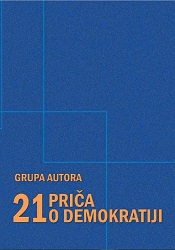Mutacija – ideološki aspek
The mutation – ideological aspect
Author(s): Milan Popović
Subject(s): Politics, Political Theory, Government/Political systems
Published by: Centar za građansko obrazovanje (CGO)
Keywords: democracy; political system; mutation; ideology;
Summary/Abstract: This article presents a relatively complex and systematic analysis of the ideological side or aspect of mutation, namely of the great and worsening change of our current historical, international, and social system, which began to escalate after the September 11th terrorist attack. The article consists of three parts, and each part consists of three sections. The first part introduces main subjects of the article. Its first section defines the very mutation as a part of greater historical change, crisis, and disintegration of the modern world-system. According to Pitirim Sorokin and Immanuel Wallerstin, this huge change began in the first quarter of XX and will last until middle of XXI century, when it will be replaced with some new historical system, which will be better or worse than the current system in crisis. The second section inserts the ideology into the context of ongoing historical change. It punctually correlates some important theoretical ideas and concepts of ideology with the most concrete and actual events and personalities of our time, like the so-called war on terror and the administration of George W. Bush. The third section explains within this context some important differences between the real and ideologically distorted meanings of such crucial categories of social sciences and politics as „New World Order“, „Globalization“, and „Fascism“. The second and central part of the article focuses on the concrete, dramatic, and colorful ideological evolution after the Cold War. Its first section reveals and describes the two substantially different phases of this evolution, its first and idealistic stage, which lasted from the Great Collapse in 1989 to the Great Strike in 2001, and which was marked by illusionary and famous Francis Fukuyama’s „end of history“, and its second and realistic phase, which began after the Great Strike 2001, and which is marked by the current ideological offensive of the so-called „neocons“ and „hawks“ from the right. In addition, the first section identifies the main novelty of the second phase, namely the appearance of an ideology, or even a cult of the naked, unlimited, and unchecked power, as well as the two main representatives of this relatively new „dark“ stance, the two Roberts, Kagan from US, and Cooper from UK. The two following sections analytically and carefully elucidate the very existence and function of this retrogressive element into the two most important ideological points or topics of our time: „Freedom“ and „World“. So, the second section reveals and explains the twofold mask of the so-called neoliberal ideology, namely neoconservative monopoles under the label and rhetoric of freedom, and, deeper in, violent postcapitalist mutation under the label and rhetoric of neoconservativism, whereas the third section reveals and analyses the first ideological signs of an open and deliberate retreat of West from one and universal world to barbaric plurality of Robert Cooper’s double standards and worlds. The third part of the article is a kind of epistemological consequence and reflection of previous analysis. The first section of this part describes the main methodological change of our time, from progressivistic to declining paradigm, metaphorically speaking from England to Pariah. The second section explains this change. In the XIX century, the modern world-system was still in its expanding and rising phase, and therefore progressivistic paradigm was quite adequate. In the XX and XXI century, however, the system has entered its declining phase, and consequently the declining paradigm has become more or only adequate. In the XIX century, Karl Marx was quite right explaining that India as less developed country could see its own future in the then England as the most developed country of the time, however, and ironically, in the XX and XXI century, the truth has become quite reverse, namely, due to the declining phase of development, now England, or EU, or US, can see its own future in the today’s least developed and even Pariah country. The third section concludes the analysis with Montenegro as one concrete Pariah country and case study. The section enlightens and summarizes extreme asymmetry between Montenegro and EU through a kind of double reflection. On the one hand, EU has served as a great power mirror, reflecting extreme smallness, weakness, and dependency of Montenegro, in the most critical period of Montenegrin existence 2000- 2003. On the other hand, and simultaneously, however, Montenegro itself has served as a small but veritable mirror, reflecting real complexity, ambiguity, and contradictory nature of the great and mighty EU.
Book: 21 priča o demokratiji
- Page Range: 215-237
- Page Count: 23
- Publication Year: 2005
- Language: Serbian
- Content File-PDF

